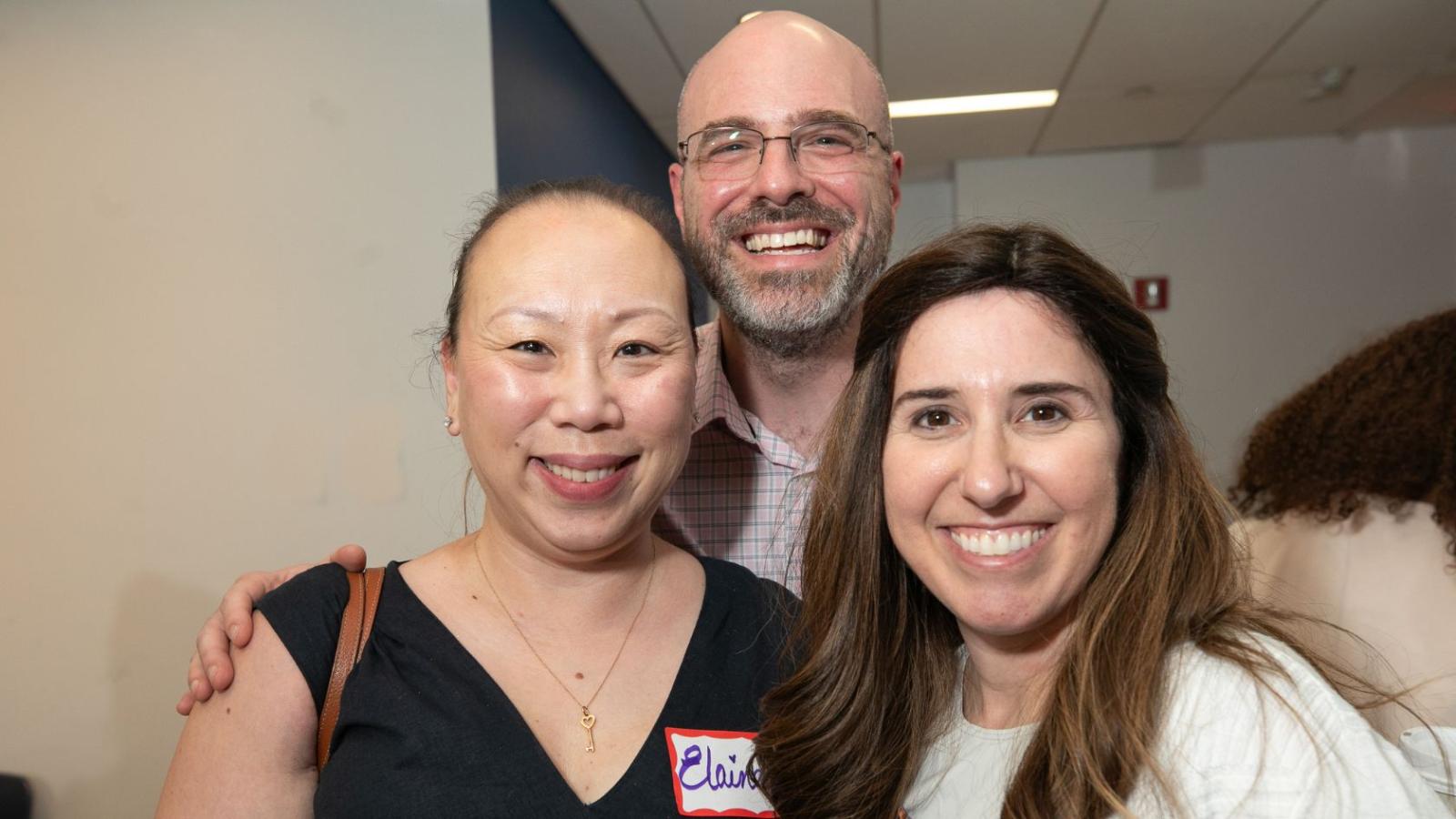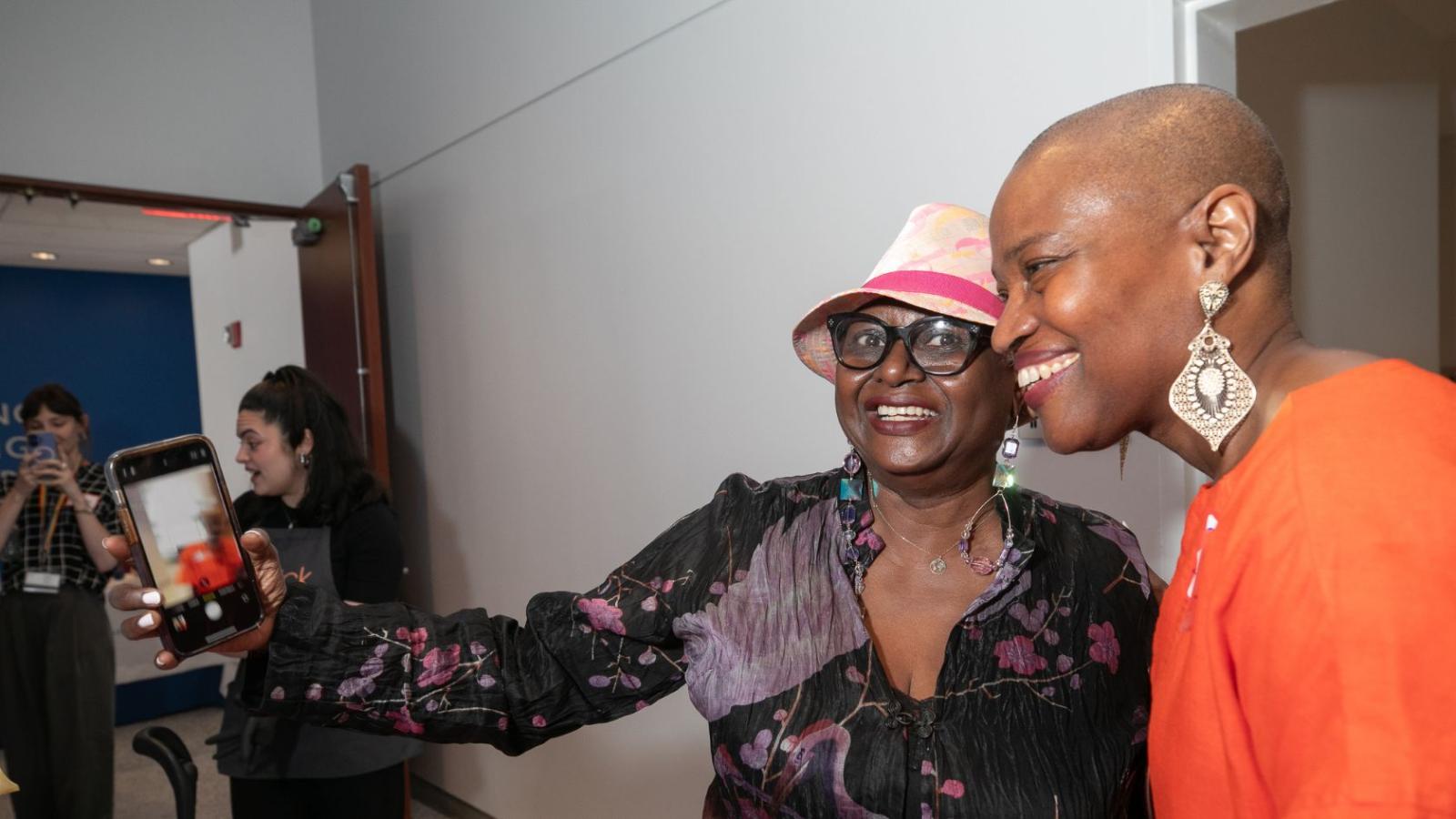Thriving Through Cancer and Beyond: A Celebration of Survivors and Thrivers at HICCC
HICCC’s Survivorship Celebration Honored Healing in Mind, Body, and Spirit

On June 5, cancer survivors and their loved ones came together for a day of healing through various movement and breath exercises to promote recovery and joy.
In recognition of National Cancer Survivors Month this June, the Herbert Irving Comprehensive Cancer Center (HICCC) hosted its inaugural “Thriving Through Cancer and Beyond” event honoring the strength, stories, and healing of those living with and beyond cancer.
Held on June 5 at the Irving Cancer Research Center, the evening brought together nearly 100 cancer survivors, thrivers, caregivers, and loved ones whose lives have been touched by cancer. Guests gathered to reflect, connect, and explore the healing power of community, self-care, and whole-person wellness.
Hosted by the HICCC’s Patient and Family Advisory Council, led by longtime patient advocate Desiree Walker, who opened the evening with remarks along with HICCC director Anil Rustgi, MD. Guests were invited to take part in hands-on experiences designed to support healing in mind, body, and spirit, such as breathwork and dance, and learned more about integrative therapies, other supportive services and ongoing research.
Kicking off the presentations, Rebecca Smith of “Body Craft Massage Therapy” led the group in a grounding breathwork session, offering techniques to manage anxiety and cultivate calm, especially during high-stress moments like waiting for test results or undergoing scans.
Later, instructors from “Moving for Life” got the crowd moving with a gentle dance session. Their evidence-based, easy-to-follow movements are designed specifically for individuals affected by cancer, promoting recovery, building somatic awareness, and supporting long-term wellbeing.
Integrative Therapies Backed by Science
Throughout the evening, HICCC experts continued to encourage the growing role of integrative therapies in cancer care. Dawn Hershman, MD, MS, FASCO, deputy director at the HICCC, shared compelling evidence on how approaches like acupuncture and massage are improving quality of life for patients, helping manage fatigue, insomnia, and pain. “Our job is not just to treat the disease,” said Hershman, “but to support our patients in a way that allows them to finish treatment and thrive throughout it.”
Michelle Bombacie, program manager at CUIMC’s Integrative Therapies Program, echoed the importance of these strategies—not as replacements, but as essential additions to cancer treatment. She introduced participants to simple yet effective tools like aromatherapy, Chi exercises, and self-massage. “Integrative therapies are not alternatives,” she explained. “They’re part of the journey.”
Caring for the Soul and Spirit
Another highlight of the evening was a powerful segment on emotional and spiritual healing, led by Shunichi Nakagawa, MD, director of palliative care services, and Chaplain Jasmine Gomez of the NewYork-Presbyterian Department of Spiritual Care.
Nakagawa emphasized the importance of introducing palliative care early—not only at the end of life. “The idea that you should only see me for end-of-life care is wrong,” he said. “We need to redefine palliative care so we can help patients sooner—by facilitating hard conversations, supporting families through difficult decisions, and offering an extra layer of care.”
Gomez spoke about creating space for patients’ emotional and spiritual needs through art, music, poetry, and faith traditions. “Spiritual care isn’t about having the right answers,” she said. “It’s about creating sacred space where people feel seen, heard, and supported.”
A Story of Hope and Resilience
The evening’s program closed with a deeply moving conversation between lung cancer survivor Oswald “Omari” Peterson and his oncologist, Catherine Shu, MD. Their reunion was emotional, as Omari shared his story of being diagnosed with stage IV lung cancer in 2017 and being given just weeks to live. Thanks to a cutting-edge immunotherapy regimen introduced by Dr. Shu, Omari now shows no evidence of cancer. “She did the impossible,” Omari said to a room of applause. “My recovery was only an inch short of resurrection.”
He credited his survival not only to medicine, but also to the community and integrative care that sustained him through treatment. His message to others: “Live in the moment. Find joy wherever you can. There’s always a reason to have hope.”
Connecting to Community
Throughout the evening, guests visited exhibitor tables and received personalized attention from organizations dedicated to survivor wellness. Among them was Lipstick Angels, a nonprofit offering oncology-sensitive beauty and wellness services, who treated attendees to hand massages, aromatherapy, and light makeup applications.
“In moments when people often feel their most vulnerable,” said Samantha Mendez, New York program manager at Lipstick Angels, “we’re there to offer care that restores a sense of dignity, confidence, and empowerment.”
“We hope this is just the first of many celebrations like this one,” said Rustgi. “Where we can come together to recognize the strength of survivors, thrivers, caregivers, and families, and extend support through a community rooted in healing and hope.”






